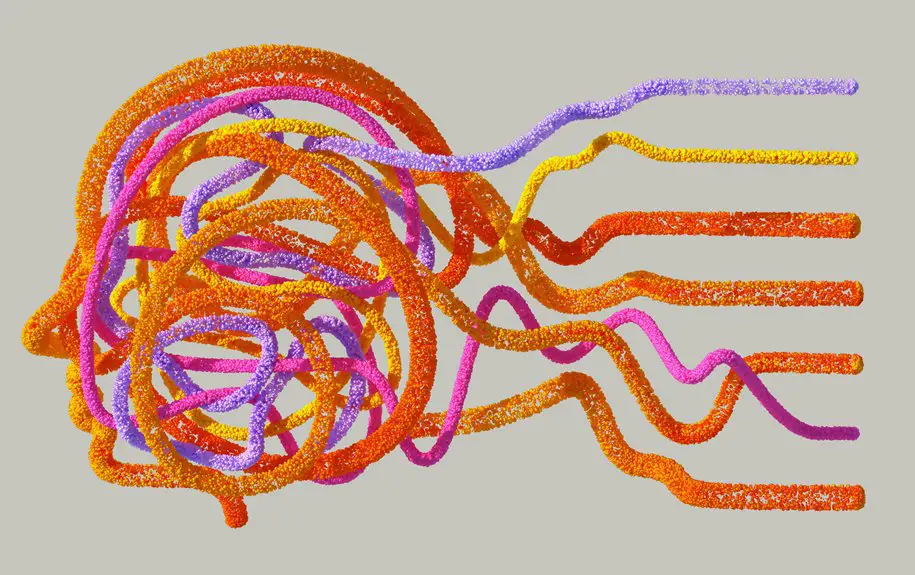You often find yourself struggling to stay focused, even in seemingly quiet environments. This constant distraction isn’t just a personal flaw; it’s rooted in the complex workings of your brain. Understanding how your attention networks operate reveals fascinating insights about why you get sidetracked. But there’s more to this story, including the influence of digital devices and the science behind multitasking. What if the key to improving your focus lies in these very revelations?
Table of Contents
Key Takeaways
- The brain’s attention networks, like the prefrontal cortex, filter distractions but can be overwhelmed by excessive stimuli from digital devices.
- Neurotransmitters such as dopamine and norepinephrine influence motivation and alertness, impacting our ability to focus on tasks.
- Frequent notifications and digital multitasking splinter attention, leading to decreased efficiency and increased cognitive load.
- Noisy environments and visual distractions create competition for attention, making it harder to concentrate on primary tasks.
- Establishing distraction-free workspaces and routines can help mitigate the effects of environmental and digital distractions on focus.
The Brain’s Attention Networks
When you focus on a task, your brain’s attention networks spring into action, orchestrating a complex interplay of regions that help filter distractions.
These networks include the anterior cingulate cortex and the prefrontal cortex, which work together to prioritize relevant information. As you dive deeper into your work, your brain becomes more adept at ignoring irrelevant stimuli.
This ability to concentrate relies on neurotransmitters like dopamine, which enhance your focus. However, when you encounter distractions—whether from your phone or background noise—these networks can become overwhelmed.
You may feel your attention slipping away, making it essential to create an environment that minimizes interruptions.
Understanding Distraction: What Happens in the Brain
When you try to focus, your brain’s attention system goes to work, managing what captures your interest.
Neurotransmitters play an essential role in this process, influencing how well you maintain concentration.
Plus, environmental factors can either boost or hinder your ability to stay on task, shaping your overall focus.
Brain’s Attention System
Although you mightn’t always notice it, your brain’s attention system plays an essential role in how you manage distractions. This system helps you focus on specific tasks while filtering out irrelevant stimuli.
It consists of various brain regions, including the prefrontal cortex, which helps prioritize information, and the parietal cortex, which processes sensory input. When you face distractions, your brain quickly decides whether to shift focus or maintain attention on your current task.
This involves a constant balancing act between engaging with relevant information and ignoring distractions. By understanding how your attention system operates, you can develop strategies to enhance your focus, minimize distractions, and improve overall productivity in your daily life.
Role of Neurotransmitters
Neurotransmitters play a significant role in how your brain manages distractions and maintains focus.
These chemical messengers influence your mood, attention, and cognitive functions. When you feel distracted, certain neurotransmitters may be out of balance, impacting your ability to concentrate.
Here are a few key players:
- Dopamine: Enhances motivation and pleasure, helping you stay engaged.
- Serotonin: Regulates mood and anxiety, affecting your focus level.
- Norepinephrine: Increases alertness and readiness, making it easier to concentrate.
- Acetylcholine: Supports learning and memory, essential for maintaining attention.
Environmental Influences on Focus
Your brain doesn’t operate in isolation; it’s deeply influenced by your surroundings. Every sound, sight, and smell can pull your attention in different directions.
For instance, a noisy café might drown out your thoughts, while a cluttered desk can make it hard to focus on a single task. The environment triggers your brain’s response to distractions, activating areas responsible for processing stimuli.
If you’re in a calm, organized space, you’re more likely to concentrate and perform better. On the flip side, chaotic environments can overwhelm you, leading to mental fatigue.
The Role of Dopamine in Focus and Distraction
When you’re trying to concentrate, the role of dopamine becomes essential in balancing focus and distraction. This neurotransmitter influences your motivation and attention, driving you to pursue tasks while also making you susceptible to distractions.
When dopamine levels fluctuate, so does your ability to stay engaged.
Consider how dopamine affects your focus:
- Reward Sensitivity: Higher dopamine can make tasks feel more rewarding, enhancing your focus.
- Motivation Boost: It drives you to start and complete tasks, reducing procrastination.
- Distraction Sensitivity: Low dopamine may heighten your susceptibility to distractions, pulling your attention away.
- Learning and Memory: Dopamine helps reinforce behaviors, making it easier to remember tasks when you’re engaged.
Understanding this balance can help you manage your focus better.
Multitasking: Myth or Reality?
You might think multitasking boosts your productivity, but your brain’s limitations suggest otherwise.
Studies show that juggling multiple tasks can actually hinder your focus and decrease efficiency.
Instead, embracing single-task strategies could lead to better results and a clearer mind.
Brain’s Limitation on Focus
Although many believe multitasking enhances productivity, research shows that the brain has inherent limitations on focus. When you try to juggle multiple tasks, your cognitive resources get stretched thin, leading to decreased efficiency.
Here’s what you need to contemplate:
- Your brain can only concentrate on one thing at a time.
- Switching between tasks creates a cognitive lag, costing you time.
- Multitasking can lead to increased stress and mental fatigue.
- You may overlook important details, leading to mistakes.
Understanding these limitations can help you prioritize tasks better and improve your overall efficiency. Instead of attempting to do everything at once, focus on one task at a time for more effective results.
Impact on Productivity Levels
Multitasking often appears appealing, especially in today’s fast-paced world, but its impact on productivity levels is frequently overstated.
When you juggle multiple tasks, your brain doesn’t handle them simultaneously; instead, it switches back and forth, leading to cognitive overload. This constant shifting drains your mental resources, causing mistakes and reducing the quality of your work. You may feel busy, but that doesn’t mean you’re being productive.
Studies show that multitasking can decrease efficiency by up to 40%. When you focus on one task at a time, you’ll likely find you complete it faster and more accurately.
Effective Single-Task Strategies
When it comes to boosting productivity, adopting effective single-task strategies can make a world of difference. By focusing on one task at a time, you can enhance your concentration and efficiency.
Here are some strategies to help you stay on track:
- Set clear goals: Define what you want to achieve for each session.
- Use timers: Implement techniques like the Pomodoro Technique to create structured work intervals.
- Minimize distractions: Identify and eliminate potential interruptions in your environment.
- Take breaks: Give your brain time to recharge, which can lead to improved focus.
The Impact of Digital Devices on Attention
As digital devices have become integral to daily life, they’ve transformed how we focus and engage with information. Instead of honing our attention, these devices often splinter it. Notifications, social media, and constant connectivity pull you in multiple directions, making it tough to concentrate.
Here’s a quick look at how digital devices affect your attention span:
| Impact | Description |
|---|---|
| Increased Multitasking | You juggle tasks, reducing focus on each. |
| Shortened Attention Span | Quick content consumption leads to impatience. |
| Frequent Interruptions | Notifications disrupt your workflow. |
Recognizing these effects can help you reclaim your focus and improve productivity in a world full of distractions.
Environmental Factors That Contribute to Distraction
When you think about distraction, consider how digital device overload can clutter your attention.
Noisy environments and visual distractions also play a major role in pulling you away from what you need to focus on.
Let’s explore how these environmental factors impact your ability to concentrate.
Digital Device Overload
While digital devices enhance connectivity and access to information, they also contribute considerably to distraction in our daily lives. You might find yourself constantly checking notifications or scrolling through apps, making it hard to focus on important tasks.
This digital device overload can fragment your attention and reduce productivity. Here are some factors that amplify this issue:
- Frequent notifications pull your attention away from what you’re doing.
- Social media encourages mindless scrolling, often at the expense of deeper engagement.
- Multitasking on devices leads to cognitive overload, diminishing overall performance.
- Easy access to entertainment distracts you from tasks requiring concentration.
Recognizing these distractions is the first step toward regaining your focus and managing device use more effectively.
Noisy Environments
How often do you find it hard to concentrate in a noisy environment? Those constant sounds can pull your focus away from tasks, making it tough to think clearly.
Your brain’s response to noise isn’t just a nuisance; it’s a survival mechanism. When you’re surrounded by distractions, your cognitive load increases, and your ability to process information declines.
The chaotic sounds, whether from chatter, traffic, or machinery, compete for your attention, leaving you feeling overwhelmed. You might notice that even minor noises can disrupt your flow, causing you to lose track of your thoughts.
To enhance your focus, try finding quieter spaces or using noise-canceling headphones. Reducing background noise can greatly improve your concentration and productivity.
Visual Distractions
Visual distractions can easily derail your focus, especially in environments filled with movement and vivid stimuli. Your brain constantly processes visual input, and certain elements can pull your attention away from tasks.
Here are some common visual distractions you might encounter:
- Bright colors: They can catch your eye and divert your attention.
- Moving objects: Anything in motion can draw your focus, whether it’s people walking by or flickering lights.
- Cluttered spaces: Disorganization can overwhelm your visual senses and make it hard to concentrate.
- Screens nearby: Notifications or video content can easily steal your gaze and disrupt your workflow.
Being aware of these distractions can help you create a more focused environment, allowing you to stay on task and improve productivity.
The Science of Habit Formation and Attention
As you navigate daily tasks, understanding the science of habit formation and attention becomes essential for enhancing your productivity. Your brain thrives on patterns, as habits create neural pathways that streamline your focus. When you repeat an action, it becomes automatic, allowing your attention to shift elsewhere.
| Habit Formation | Attention Management |
|---|---|
| Repetition builds habits | Focus on one task at a time |
| Consistency reinforces behavior | Limit multitasking |
| Rewards strengthen habits | Set clear goals |
Strategies to Improve Focus and Reduce Distractions
While distractions can derail your productivity, implementing effective strategies can greatly enhance your focus.
Start by creating a designated workspace free from interruptions. Limit your exposure to digital distractions by turning off notifications or using apps that block social media during work hours.
Designate a distraction-free workspace and minimize digital interruptions by disabling notifications and utilizing blocking apps.
Establish a routine that includes regular breaks to refresh your mind and sustain your energy levels. Finally, prioritize tasks to funnel your attention where it matters most.
- Set clear goals for each work session.
- Use the Pomodoro technique: 25 minutes of focused work followed by a 5-minute break.
- Practice single-tasking instead of multitasking.
- Keep a distraction journal to identify triggers and patterns.
Mindfulness and Its Effects on Attention
Mindfulness practices can greatly enhance your attention by training your brain to focus on the present moment. When you engage in mindfulness, you learn to recognize distractions without judgment and return your focus back to what matters. This skill helps improve your concentration and reduces the likelihood of becoming sidetracked.
Here’s a quick overview of mindfulness techniques and their effects on attention:
| Mindfulness Technique | Attention Effect |
|---|---|
| Meditation | Increases sustained focus |
| Deep Breathing | Reduces stress and anxiety |
| Body Scanning | Enhances body awareness |
Future Research Directions in Attention Neuroscience
Understanding how attention functions is just the beginning; future research in attention neuroscience promises to uncover deeper insights into its complexities.
Future research in attention neuroscience holds the potential to reveal intricate layers of understanding about how attention operates.
As you explore this field, consider the following directions that could shape our understanding of attention:
- Neuroplasticity: Investigate how our brains adapt and change in response to different attentional demands.
- Technology Integration: Explore how brain-computer interfaces can help measure and enhance attention in real-time.
- Individual Differences: Study how genetic and environmental factors influence attentional strengths and weaknesses.
- Impact of Digital Environments: Analyze how constant digital stimuli affect attention spans and cognitive performance.
These directions could lead to groundbreaking discoveries, helping you better understand not just attention, but the broader implications for cognitive health and productivity.
Frequently Asked Questions
How Does Age Affect Our Ability to Concentrate?
As you age, your ability to concentrate often declines due to changes in cognitive function. You might find it harder to focus on tasks, as distractions become more challenging to resist and manage effectively.
Can Diet Influence Our Attention Span?
Yes, your diet can greatly influence your attention span. Consuming balanced meals rich in whole grains, fruits, and healthy fats fuels your brain, while high sugar or processed foods could lead to distractions and reduced focus.
What Role Does Sleep Play in Focus and Distraction?
Sleep notably impacts your focus and distraction levels. When you’re well-rested, your brain functions better, enhancing concentration. Conversely, lack of sleep leads to fatigue, making it harder for you to maintain attention on tasks.
Are Certain Personalities More Prone to Distraction?
Certain personalities, like those who’re more impulsive or easily bored, often find themselves more prone to distraction. If you’re naturally curious or have a short attention span, staying focused might be a bigger challenge for you.
How Does Physical Exercise Impact Attention and Focus?
Physical exercise boosts your attention and focus by increasing blood flow to your brain, releasing endorphins, and improving mood. Regular workouts sharpen your mental clarity, helping you concentrate better on tasks throughout the day.




